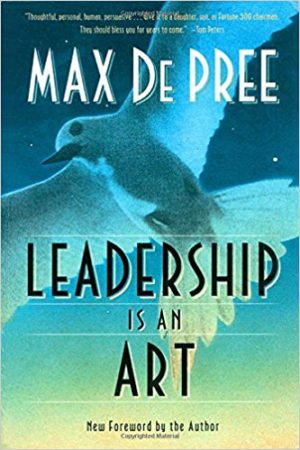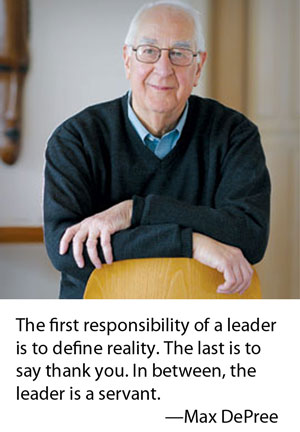Nearly twenty years ago I read Leadership is an Art by Max De Pree. The former CEO of the legendary company Herman Miller, De Pree was one of the great business leaders of his day. So naturally, I was eager to find out what he had to say.

The book had a profound impact on my understanding and practice of leadership. The most significant line for me was, “The first responsibility of a leader is to define reality. The last is to say thank you. In between the two, the leader must become a servant and a debtor.”
I’ve always loved the image of the leader (or leaders) defining reality. What will we be tomorrow, or what will our company be, even our world? A leader defines what might be, works as a servant to make it happen, and says thank you to all who contributed. It’s an enlightened, even Biblical perspective on leadership.
Another influential line is, “Profit, the hoped-for result of the “how,” is normal and essential. Those results, however, are only a way to measure our resourcefulness at a point in time, mile markers on a long road. Why we get those results is more important.”
De Pree was telling us to “start with why” decades before Simon Sinek. He was also giving us a purpose beyond profits. More than one self-righteous young social impact entrepreneur should be reminded of this. It’s nothing new guys, and folks like De Pree were promoting it before you were born.
And then there is, “I do not know of a better system, but the capitalist system can be improved, both in practice and in theory, with the influence of an inclusive perspective. The aim is not primarily to improve the results, although that is a significant possibility. The aim is to embody the concept of persons, for a substantial concept of persons must underlie an inclusive system. A belief that every person brings an offering to a group requires us to include as many people as possible. Including people, if we believe in the intrinsic value of their diversity, will be the only path open to us.”
What a profound statement from a white man — a man of privilege no less. And this was practiced throughout his long career, which started more than 60 years ago.
More times than I care to admit, I’ve failed to live up to this high calling of leadership. But De Pree’s thoughts continue to shape how I lead, and I continue to learn from his book.
That is why when Mark Roberts of the Max De Pree Center for Leadership invited me to lunch, I jumped at the opportunity. And when Max De Pree’s daughter, Jody, invited me to dinner with one of her colleagues on the board, I immediately accepted.
And it is why, with humility and excitement, I accepted the offer to join the De Pree Center Advisory Board. I look forward to honoring the words and ideas of Mr. De Pree and learn from other great leaders along the way.


